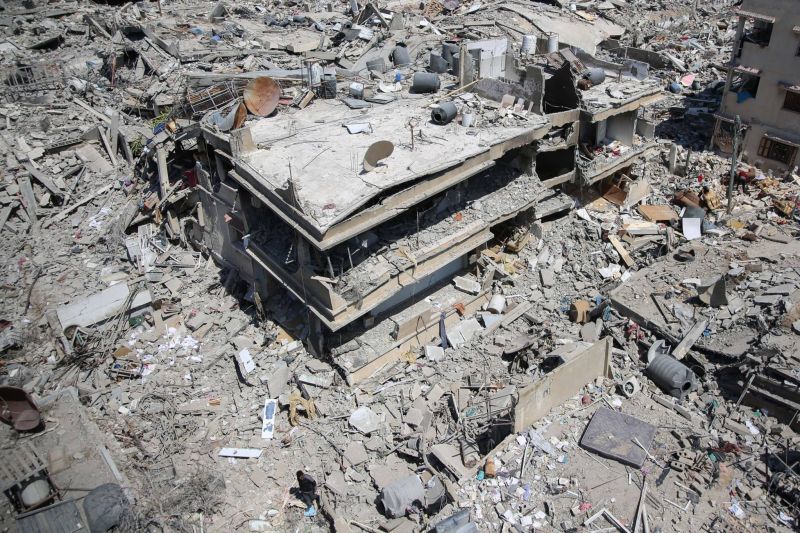
A Palestinian man walks on building rubble in a devastated area around Gaza's Al-Shifa hospital on April 3, 2024, amid the ongoing conflict between Israel and the Palestinian Hamas militant group. (Credit: AFP)
Want to get the Morning Brief by email? Click here to sign up.
Catch up on yesterday’s LIVE coverage of Day 180 of the Gaza war here.
While retaining the possibility of an expanded conflict with Hezbollah, Israeli Defense Minister Yoav Gallant said Israel “does not wish for a war in Lebanon,” finding it would be a “difficult challenge” for Israel. Later the Jerusalem Post reported a request by the Israeli ministry for $10 million to provide “operational continuity in the event of an emergency.” Israeli press last month reported that the government stockpiled supplies and developed shelters in northern Israel. Also yesterday, Hezbollah Secretary-General Hassan Nasrallah in a speech marking Jerusalem Day – which falls on the last Friday of Ramadan – said the “resistance front, in Yemen, Lebanon and Iraq, is under pressure and continues its work.” The party, continuing to claim cross-border strikes on northern Israeli military targets, announced the death of one of its fighters, mounting its death toll in Syria and Lebanon since Oct. 8 to 267 people. Residents of southern Lebanon continued to witness strikes across the area, including white phosphorus shelling in Ramieh and Aita al-Shaab, Gallant’s statement came after a meeting with US officials who repeated their apprehensions against Israel’s invasion of Rafah. Israeli officials have repeatedly made bellicose statements threatening military escalation with Hezbollah if diplomacy fails to guarantee the return of displaced residents to northern Israel. Prior to the targeting of an Iranian diplomatic mission in Syria that killed one Hezbollah member and senior Iranian military personnel, Israel’s military over the past week expanded the range of its airstrikes, repeatedly striking eastern Lebanon, killed several rescue workers in southern Lebanon and ramped-up drone assassinations targeting Hezbollah officials.
Preliminary investigations found that a landmine injured three United Nations military observers and their assistant last Saturday, a Lebanese Army official told AFP. Lebanon initially blamed Israel for the explosion, while Israel yesterday claimed that Hezbollah had placed the explosive charge. United Nations Interim Force in Lebanon (UNIFIL) spokesperson Andrea Tenenti told AFP early reports show the explosion did not result from “direct or indirect fire,” a day after confirming that the three observers are “doing better and recovering.” UNIFIL positions and personnel have been hit by Israeli fire several times since Oct. 8. Since the expansion of UNIFIL’s responsibilities in Security Council Resolution 1701, which ushered in the end of the Hezbollah-Israel war, peacekeepers have conducted demining missions in their area of operations – which have injured the troops clearing them and killed area residents well after the ends of the decades-long Israeli occupation and the 2006 war during which they were left behind. Last March, a UNIFIL spokesperson told L’Orient Today that “landmines remain a serious threat along the Blue Line” after an anti-personnel device’s detonation injured several Israeli soldiers.
The United States Agency for International Development (USAID) pledged $67 million in further assistance to Lebanon’s most vulnerable residents, citing “the urgent humanitarian assistance needs of the 91,000 internally displaced persons.” The USAID announcement said the funds aim to ensure months of continued “emergency food assistance, nutritional support, emergency health care, humanitarian protection and psychological support, as well as water, sanitation and hygiene services” to more than half a million people, including impoverished Lebanese and Syrian refugee populations. The statement also references “insecurity in South Lebanon,” where the International Organization of Migration (IOM) estimates that more than 91,000 people have been displaced since the start of the Hezbollah-Israeli border clashes.
The Internal Security Forces (ISF) announced another seizure of hashish destined to be smuggled into an unspecified European country disguised as foodstuffs. The raid on a warehouse in Mar Mikhael, where 27 kilograms of cannabis resin was concealed in coffee, tea and sweets packages destined for export by sea, comes a week after 150 kilograms of hasish were confiscated before they could be flown overseas cushioned in Lebanese pantry staples. Drug smuggling attempts uncovered by the ISF have found banned substances creatively concealed in food, industrial and carpentry products.
At least 32,975 people have been killed in Gaza since Oct. 7, according to the latest figures from the enclave’s health ministry. Hamas political chief Ismail Haniyeh repeated the group’s conditions for a ceasefire deal from a Jerusalem Day address in Beirut, as Israeli delegates left Cairo with a new proposal. Several attempts to reach a cease-fire deal have failed to mend the gap as Israel’s demands for immediate hostage releases and information on the captives have been met with Hamas saying neither can happen before a pause in hostilities – additionally demanding a withdrawal of Israeli troops and ramped up aid deliveries to the increasingly famine-struck enclave. As cease-fire talks drawl on, Israel’s insistence on invading Rafah faces concerns from the US, one of its main allies, and other international actors finding no plausible solution to safeguard the more than 1.5 million displaced Palestinians in Gaza’s southernmost city. After the United Nations Security Council last month resolved for an immediate cease-fire in Gaza, some of its members now propose the deployment of UN truce monitors and condemnations of the Israeli attack on an Iranian diplomatic mission in Syria while the UN Human Rights Council is set to weigh on embargoing arms exports to Israel.
In case you missed it, here’s our must-read story from yesterday: “Is Israel eyeing Palestinian camps in Lebanon?”
Compiled by Abbas Mahfouz